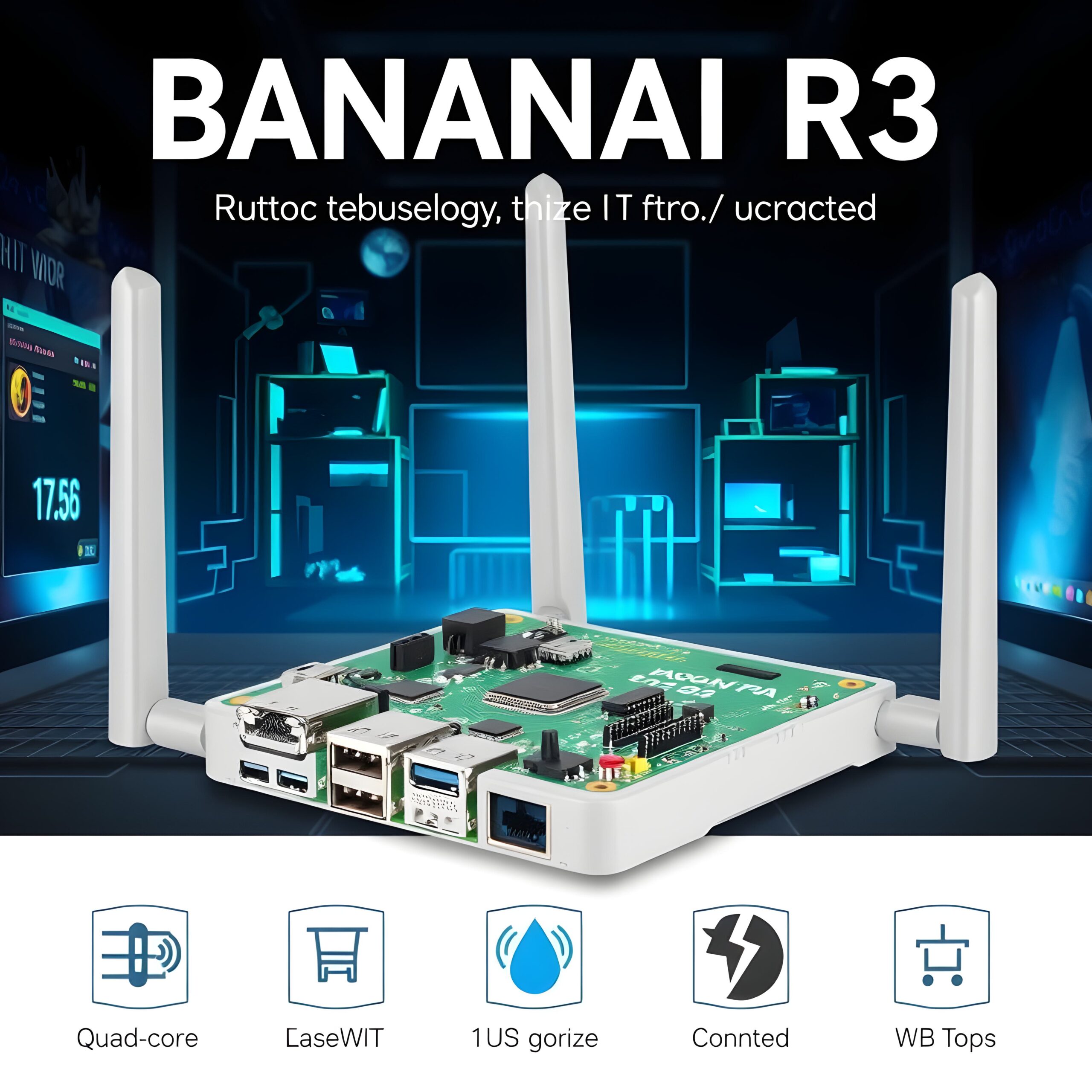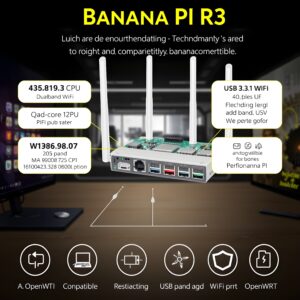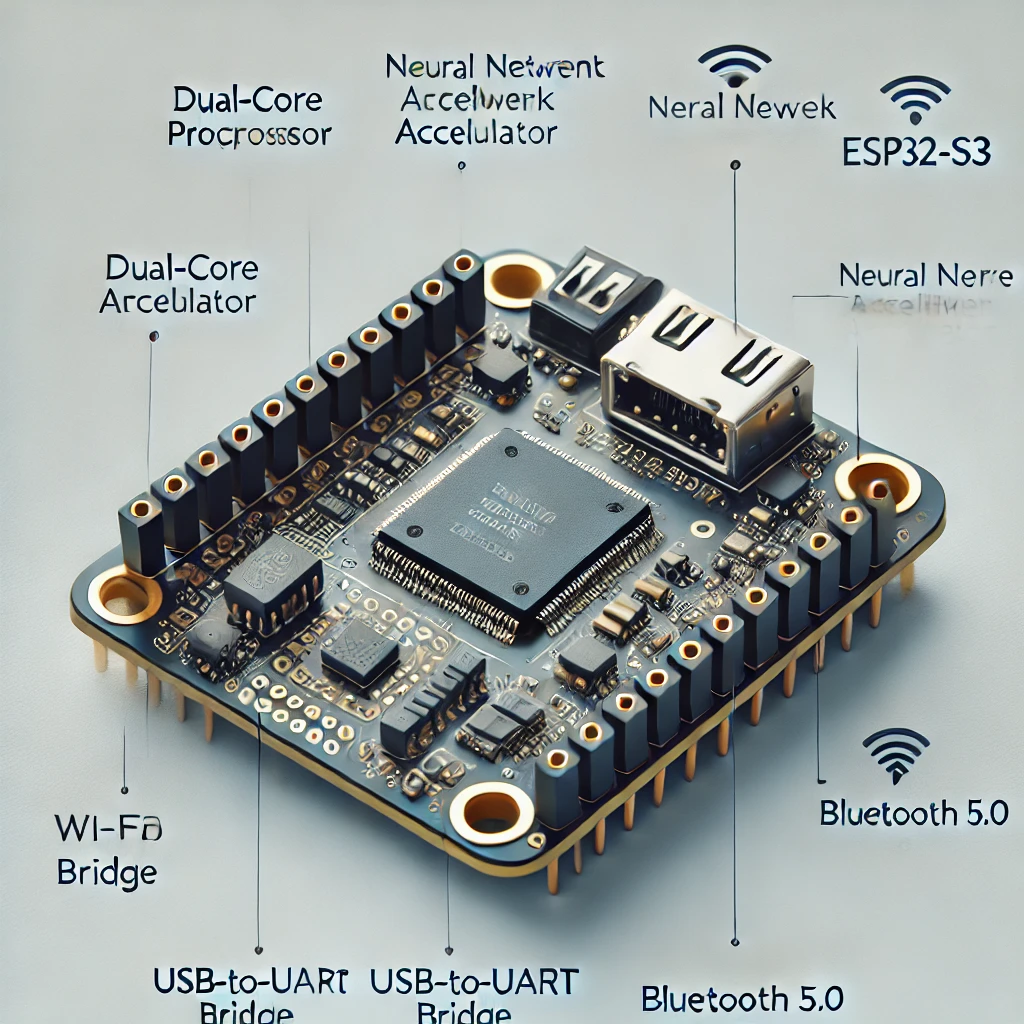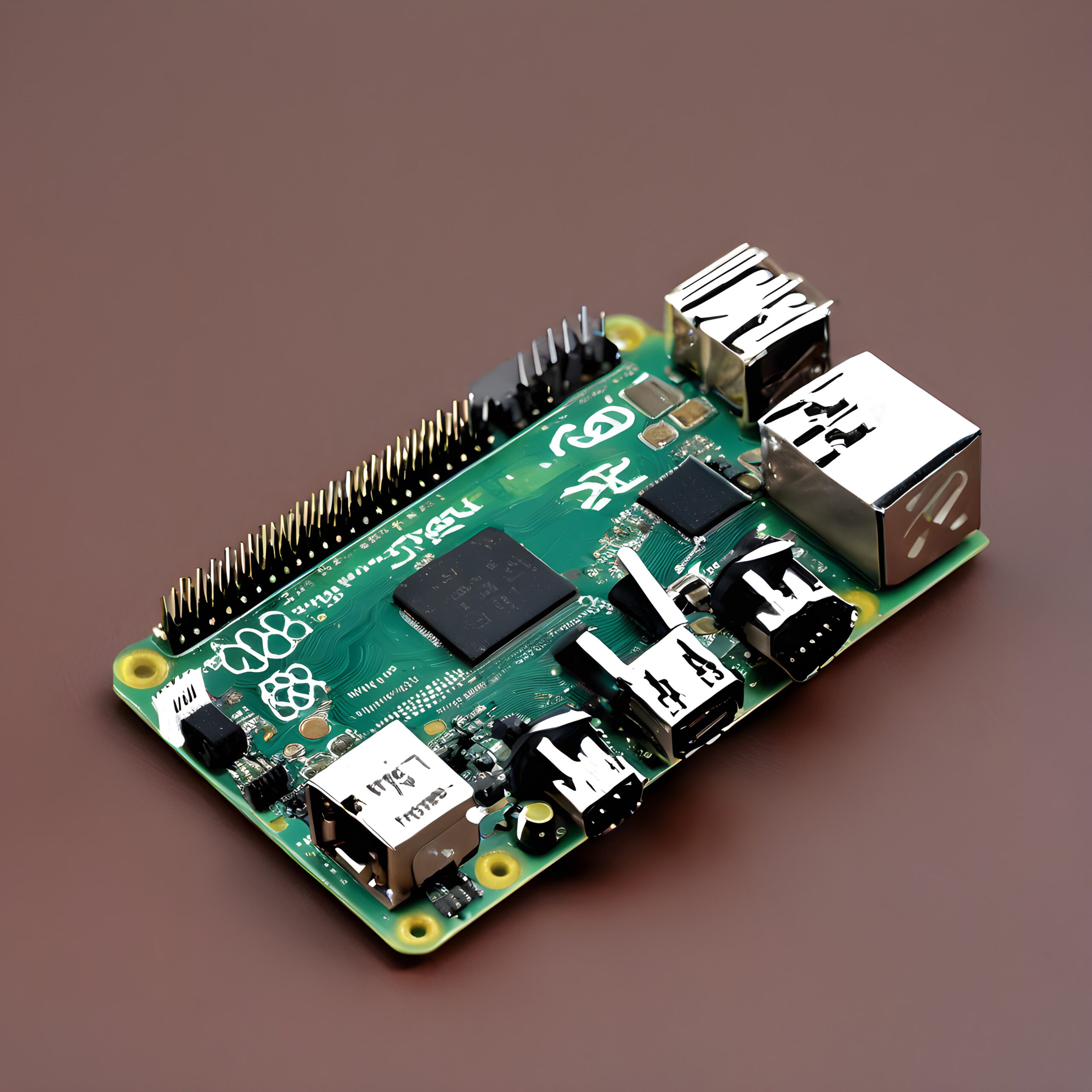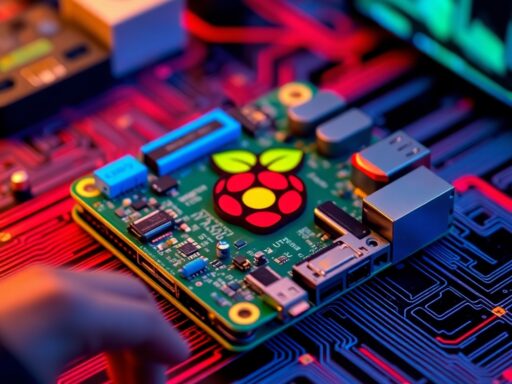Discover the future of OpenWRT routers with the Banana Pi R3, a game-changing device that offers unparalleled performance, flexibility, and customization options. Learn how this innovative router is set to revolutionize the world of open-source networking.
Open-source networking has gained tremendous popularity over the years, particularly with the emergence of OpenWRT routers. These routers have long been favored by tech enthusiasts, developers, and those seeking greater control over their network environments. Yet, with the increasing complexity of modern home networks, the demand for more powerful and flexible devices has escalated. Enter the Banana Pi R3—an innovative, high-performance router that is poised to set new standards in the world of OpenWRT routers.
The Banana Pi R3 is designed to address the growing needs of both home users and developers, delivering blazing-fast performance, high-level customization, and future-proof features. Combining powerful hardware with seamless OpenWRT integration, the R3 offers users the opportunity to unlock a truly tailored networking experience. In this article, we explore why the Banana Pi R3 is set to revolutionize OpenWRT routers and what makes it the go-to choice for networking enthusiasts and small businesses alike.
What is the Banana Pi R3?
The Banana Pi R3 is the latest addition to the Banana Pi series of single-board computers and routers. It is a high-performance device developed by the Banana Pi team, a community of engineers and developers committed to creating versatile and powerful open-source hardware. Built around a quad-core Cortex-A72 CPU, 2GB of DDR4 RAM, and 16GB of eMMC storage, the R3 delivers outstanding performance that sets it apart from other routers in its category.
What makes the Banana Pi R3 even more appealing is its deep compatibility with OpenWRT, an open-source operating system that empowers users to fully customize and control their router’s features. Whether you’re interested in setting up advanced security configurations, optimizing your network’s performance, or installing additional packages and firmware, the Banana Pi R3 gives you all the tools you need to create your ideal network.
Key Features and Benefits
The Banana Pi R3 comes with a wide range of features designed to offer superior networking performance, flexibility, and future-proof capabilities. Let’s dive deeper into some of the most noteworthy specifications:
- Quad-Core Cortex-A72 CPU: The powerful quad-core processor ensures smooth and fast performance, even when multiple devices are connected and demanding high bandwidth.
- 2GB DDR4 RAM: With 2GB of DDR4 RAM, the R3 offers ample memory to handle simultaneous applications and services, making it perfect for a wide range of use cases—from home networking to complex development tasks.
- 16GB eMMC Storage: The built-in storage provides users with enough room to install additional firmware, applications, and custom configurations, ensuring the router remains flexible and adaptable to future needs.
- Gigabit Ethernet Ports: The R3 features high-speed gigabit Ethernet ports, providing fast and reliable wired connectivity for devices like computers, gaming consoles, and media servers.
- Dual-Band Wi-Fi: With support for both 2.4GHz and 5GHz Wi-Fi frequencies, the R3 ensures optimal wireless performance for a wide range of devices, whether for everyday browsing, video streaming, or gaming.
- USB 3.0 Ports: These ports provide high-speed connectivity for external devices, enabling the Banana Pi R3 to act as a file server or support additional peripherals.
These specifications make the Banana Pi R3 a top-tier router in the OpenWRT ecosystem, offering both advanced features and robust hardware to deliver superior performance.
Customization and Flexibility
A major advantage of the Banana Pi R3 is the level of customization it offers users. Thanks to its seamless OpenWRT compatibility, the R3 provides access to many tools, packages, and configurations that allow users to tailor their networking experience.
- Firmware Customization: Users can install custom firmware to enhance the router’s capabilities or even modify its core functions. OpenWRT supports a variety of advanced networking features, including VPNs, firewall management, quality of service (QoS) settings, and more.
- Application Support: With OpenWRT’s package management system, users can install a variety of applications and packages, ranging from security tools to network monitoring software, and even server applications.
- Advanced Networking Configurations: OpenWRT allows for fine-tuning of network settings to ensure that the router is optimized for specific use cases, such as gaming, streaming, or file sharing.
The open-source nature of the Banana Pi R3 also provides the flexibility to run other operating systems such as Linux, Android, or even custom configurations tailored for specific business needs or development environments. This adaptability is one of the core reasons why the R3 is an ideal device for tech enthusiasts and developers.
Performance and Benchmarks
When it comes to raw performance, the Banana Pi R3 excels in multiple areas. Benchmarks show that it outperforms many traditional routers in terms of speed, responsiveness, and the ability to handle heavy network traffic.
The R3’s quad-core Cortex-A72 CPU ensures seamless performance even under heavy loads, making it ideal for tasks like video streaming, gaming, and heavy file transfers. With 2GB of DDR4 RAM, users can run multiple applications and services simultaneously without experiencing lag or slowdowns, even when multiple devices are connected to the network.
In tests involving large file transfers, streaming 4K content, and supporting several IoT devices, the R3 demonstrated impressive stability and speed, consistently outperforming many other routers in its class. This makes it an excellent choice for both home users looking for a high-performance router and small businesses that require reliable, high-speed internet connectivity for operations.
Practical Use Cases of the Banana Pi R3
The versatility of the Banana Pi R3 allows it to be used in a variety of real-world scenarios, both for home and business networks. Here are some key use cases:
- Home Networking: With its gigabit Ethernet ports and dual-band Wi-Fi, the R3 can support high-demand applications like 4K streaming, gaming, and multi-device IoT networks without sacrificing performance.
- Small Business Networking: The R3’s advanced features, including VPN support, firewall management, and multiple Ethernet ports, make it an ideal choice for small businesses that require secure, reliable, and high-speed internet connectivity.
- IoT Networking: As the number of IoT devices in homes and businesses grows, the Banana Pi R3 provides an ideal backbone for managing and securing large numbers of interconnected devices, ensuring stable and reliable connectivity.
- Media Server: With USB 3.0 ports and SD card support, the Banana Pi R3 can be configured as a home media server, enabling users to store and stream movies, music, and other files across their network.
These use cases highlight the Banana Pi R3’s versatility, making it suitable for a broad spectrum of users—from casual consumers to more advanced developers and businesses.
Comparing the Banana Pi R3 to Other Routers
When compared to other OpenWRT routers or traditional commercial routers, the Banana Pi R3 stands out in several key areas:
- Performance: The R3’s quad-core processor and ample RAM provide superior performance, especially when handling demanding tasks such as streaming, gaming, and managing multiple connected devices. It outpaces many Raspberry Pi-based routers and similar models on the market.
- Customization: OpenWRT support gives the R3 an edge in terms of customization. Unlike many commercial routers, which often lock users into proprietary firmware, the R3 allows for a high degree of flexibility, enabling advanced configurations and custom features.
- Cost-Effectiveness: Despite its high-end performance, the R3 is priced competitively, making it an excellent value for users who want the flexibility and performance of an advanced router without the premium price tag of some commercial devices.
The Banana Pi R3 is an ideal option for those looking for a balance between performance, cost, and customization. Whether you’re building a home network or creating a small business infrastructure, the R3 provides outstanding value.
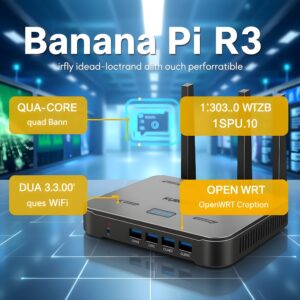
Frequently Asked Questions (FAQ)
- What is the Banana Pi R3? The Banana Pi R3 is a high-performance router board designed to work seamlessly with OpenWRT, an open-source router operating system. It features a powerful quad-core Cortex-A72 CPU, 2GB DDR4 RAM, and 16GB of eMMC storage, making it a great option for users looking for advanced, customizable networking solutions.
- Is the Banana Pi R3 compatible with OpenWRT? Yes, the Banana Pi R3 is fully compatible with OpenWRT. This open-source firmware provides advanced users with the ability to modify and customize router settings, install additional packages, and set up advanced network configurations such as VPNs, firewalls, and more.
- What are the key hardware specifications of the Banana Pi R3? The Banana Pi R3 is equipped with:
- A quad-core Cortex-A72 CPU
- 2GB DDR4 RAM
- 16GB eMMC storage
- Gigabit Ethernet ports
- Dual-band Wi-Fi (2.4GHz and 5GHz)
- USB 3.0 ports for external devices These specifications provide the R3 with superior performance, making it capable of handling high-demand tasks and a variety of networking applications.
- How does the Banana Pi R3 compare to other OpenWRT routers? The Banana Pi R3 outperforms many other OpenWRT routers due to its powerful quad-core processor and ample memory. It provides faster speeds, more flexibility, and better support for multiple devices connected simultaneously. Unlike commercial routers, it offers users the freedom to customize and install third-party firmware, making it a top choice for developers and tech enthusiasts.
- Can I use the Banana Pi R3 for gaming or streaming? Yes, the Banana Pi R3 is more than capable of supporting gaming and streaming. Its quad-core processor and 2GB RAM provide ample resources to handle high-bandwidth activities such as 4K video streaming, online gaming, and file-sharing without performance degradation. The dual-band Wi-Fi ensures that multiple devices can connect to the network without interference.
- What operating systems can I use with the Banana Pi R3? The Banana Pi R3 supports a variety of operating systems, including OpenWRT, Linux, Android, and even Windows. This flexibility allows users to choose the system that best fits their needs, whether it’s for a custom networking setup, development work, or a media server.
- Can the Banana Pi R3 be used for home automation or IoT projects? Absolutely! The Banana Pi R3 is an ideal choice for Internet of Things (IoT) projects and home automation. Its robust hardware and OpenWRT compatibility allow it to manage multiple IoT devices, ensuring stable connectivity and advanced security for smart home applications.
- What kind of storage options does the Banana Pi R3 support? The Banana Pi R3 comes with 16GB of eMMC storage built in, which is ideal for running the operating system and storing essential configurations. Additionally, it has USB 3.0 ports, which can be used to connect external storage devices such as hard drives or flash drives for more storage capacity.
- Is the Banana Pi R3 suitable for small businesses? Yes, the Banana Pi R3 is a great choice for small businesses. It offers fast and reliable internet connectivity, advanced security features, VPN support, and custom configurations. Whether for managing internal networks or providing secure access for remote workers, the R3 is highly adaptable to business needs.
- How difficult is it to set up the Banana Pi R3 for a beginner? While the Banana Pi R3 offers extensive customization options, setting it up for a beginner can be straightforward with the right resources. The device comes with documentation and there are many online guides available for configuring OpenWRT and other operating systems. For those new to networking, the open-source community offers a wealth of tutorials and forums to assist in setup.
- Can I use the Banana Pi R3 for mesh networking?
Yes, the Banana Pi R3 can be used for mesh networking with the help of OpenWRT’s software features. OpenWRT supports multiple wireless mesh protocols such as 802.11s, which can be used to create a mesh network by connecting several R3 devices. This makes it an ideal solution for expanding network coverage in larger homes or office spaces. However, it requires proper configuration of the firmware, so users need to be comfortable with OpenWRT’s advanced settings. - Does the Banana Pi R3 support VPN connections?
Yes, the Banana Pi R3 supports VPN connections, which can be configured through OpenWRT. Users can set up a VPN server (like OpenVPN) or connect to an existing VPN service, providing an additional layer of security for remote access to the network. This feature is particularly valuable for users who require secure browsing and remote connections for personal or business use. - How does the Banana Pi R3 handle power consumption?
The Banana Pi R3 is designed to be energy-efficient despite its powerful hardware. While its power consumption is higher than that of lower-end routers, it remains relatively low compared to desktop computers or servers with similar processing power. With its compact form factor and ARM-based architecture, the R3 consumes less power while delivering high performance. This makes it a good choice for users looking to build a powerful network with minimal electricity usage. - Can the Banana Pi R3 handle multiple devices at once without slowing down?
Yes, the Banana Pi R3 is well-suited to handle multiple devices simultaneously. With its quad-core processor and 2GB of DDR4 RAM, it can maintain stable and high-speed connections for numerous devices, including smartphones, laptops, smart TVs, and IoT devices. Its gigabit Ethernet ports and dual-band Wi-Fi also ensure that both wired and wireless connections remain fast and reliable under load. - Is the Banana Pi R3 beginner-friendly for setting up a home network?
The Banana Pi R3 is more suitable for intermediate or advanced users due to its reliance on OpenWRT, which requires some technical knowledge for setup and configuration. However, beginners can still get up and running with basic configurations, especially with the support of online guides and community forums. For users who are new to OpenWRT, the Banana Pi R3 provides an excellent learning platform for networking, but may require some time to master advanced features like VLANs, firewall configurations, and VPN setups.
The Banana Pi R3 is set to revolutionize the OpenWRT router market with its unparalleled performance, flexibility, and extensive customization options. Whether you’re a tech enthusiast, a developer, or a small business owner, this powerful router is designed to meet the ever-growing demands of modern networking. With its advanced hardware, open-source capabilities, and ease of use, the Banana Pi R3 is a game-changing device that will shape the future of open-source routers. Experience the future of networking with the Banana Pi R3 and unlock the full potential of your network.

